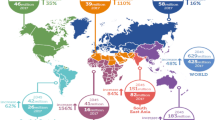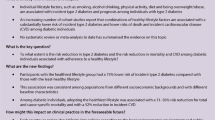Abstract
Purpose
Metabolic syndrome (MetS) is a constellation of clinical factors that indicates elevated risk of diabetes. It is diagnosed based on three or more abnormalities in its components. This does not take into account that MetS can likely present as a continuum of risk. We aim to develop a MetS severity score and assess its association with incident diabetes.
Methods
In total, 4149 subjects without baseline diabetes participated in a community screening programme in 2013–2017. MetS was defined according to International Diabetes Federation criteria. A MetS severity z-score was derived from standardised loading coefficients of a confirmatory factor analysis for waist circumference, triglycerides, HDL-cholesterol, blood pressure and fasting plasma glucose (FPG). Multivariable cox proportional hazards regression model was used to assess the risk of diabetes by the score with adjustment for demographics and MetS components.
Results
Diabetes occurred in 130 subjects. Quintile 5 of the baseline MetS severity z-score was significantly associated with development of diabetes even in fully adjusted model with HR 2.63 (95% CI: 1.04–6.64; p = 0.040). The relationship between MetS and incident diabetes became attenuated and non-significant in fully adjusted model with HR 0.67 (95% CI: 0.34–1.29; p = 0.228). Mediation analysis showed that MetS severity z-score accounted 61.0% of the association between increasing body mass index and development of diabetes (p < 0.001).
Conclusions
The MetS severity z-score is an inexpensive and clinically-available continuous measure of MetS to identify individuals at high risk of diabetes.


Similar content being viewed by others
References
Ministry of Health S. Better health, better care, better life. The war on diabetes. (2016). https://www.moh.gov.sg/content/dam/moh_web/PressRoom/Highlights/2016/cos/factsheets/COS_Factsheet%20-%20Diabetes.pdf. Accessed 1 May 2018
Ministry of Health S. Singapore burden of disease study 2010. (2014). https://www.moh.ov.sg/content/moh_web/home/Publications/Reports/2014/singaporeburden-of-disease-study-2010.html. Accessed 1 Aug 2018
M.J. Gurka, C.L. Ice, S.S. Sun, M.D. Deboer, A confirmatory factor analysis of the metabolic syndrome in adolescents: an examination of sex and racial/ethnic differences. Cardiovasc. Diabetol. 11, 128 (2012)
Federation ID. The IDF consensus worldwide definition of the metabolic syndrome. (2006). https://www.idf.org/component/attachments/attachments.html?id=705&task=download. Accessed 2 Oct 2018
S. de Ferranti, D. Mozaffarian, The perfect storm: obesity, adipocyte dysfunction, and metabolic consequences. Clin. Chem. 54, 945–955 (2008)
M.D. DeBoer, Obesity, systemic inflammation, and increased risk for cardiovascular disease and diabetes among adolescents: a need for screening tools to target interventions. Nutrition 29, 379–386 (2013)
M.J. Gurka, S.H. Golden, S.K. Musani et al. Independent associations between a metabolic syndrome severity score and future diabetes by sex and race: the Atherosclerosis Risk In Communities Study and Jackson Heart Study. Diabetologia 60, 1261–1270 (2017)
G.I. Shulman, Ectopic fat in insulin resistance, dyslipidemia, and cardiometabolic disease. N. Engl. J. Med. 371, 1131–1141 (2014)
C. Lorenzo, M. Okoloise, K. Williams, M.P. Stern, S.M. Haffner, The metabolic syndrome as predictor of type 2 diabetes: the San Antonio heart study. Diabetes Care 26, 3153–3159 (2003)
M.D. DeBoer, M.J. Gurka, Clinical utility of metabolic syndrome severity scores: considerations for practitioners. Diabetes Metab. Syndr. Obes. 10, 65–72 (2017)
B.D. Dimitrov, K.M. Bahchevanov, P.A. Atanassova et al. Metabolic syndrome severity score: range and associations with cardiovascular risk factors. Arch. Med. Sci. Atheroscler. Dis. 1, e90–e97 (2016)
J.K. Gustafson, L.B. Yanoff, B.D. Easter et al.The stability of metabolic syndrome in children and adolescents. J. Clin. Endocrinol. Metab. 94, 4828–4834 (2009)
C. Li, E.S. Ford, T.T. Huang, S.S. Sun, E. Goodman, Patterns of change in cardiometabolic risk factors associated with the metabolic syndrome among children and adolescents: the Fels Longitudinal Study. J. Pediatr. 155, S5.e9–e16 (2009)
M.D. DeBoer, M.J. Gurka, J.G. Woo, J.A. Morrison, Severity of the metabolic syndrome as a predictor of type 2 diabetes between childhood and adulthood: the Princeton Lipid Research Cohort Study. Diabetologia 58, 2745–2752 (2015)
M.J. Gurka, S.L. Filipp, T.A. Pearson, M.D. DeBoer, Assessing baseline and temporal changes in cardiometabolic risk using metabolic syndrome severity and common risk scores. J. Am. Heart Assoc. 7, e009754 (2018)
C.G. Magnussen, S. Cheriyan, M.A. Sabin et al. Continuous and dichotomous metabolic syndrome definitions in youth predict adult type 2 diabetes and carotid artery intima media thickness: The cardiovascular risk in young finns study. J. Pediatr. 171, 97–103.e1-e3 (2016)
S. Low, K.C.J. Khoo, B. Irwan et al. The role of triglyceride glucose index in development of type 2 diabetes mellitus. Diabetes Res. Clin. Pract. 143, 43–49 (2018)
Roche. Glucose H. K. Gen.3: Cobas. (Roche Diagnostics GmBH, Mannheim, Germany, 2016)
Roche. Triglycerides: Cobas. (Roche Diagnostics GmbH, Mannheim, Germany, 2016)
Roche. HDL-Cholesterol Plus Generation: Cobas. (Roche Diagnostics GmBH, Mannheim, Germany, 2016)
American Diabetes Association, Standards of medical care in diabetes—2017. Diabetes Care 40, S1–S135 (2017)
V.S. Effoe, A. Correa, H. Chen, M.E. Lacy, A.G. Bertoni, High-sensitivity C-reactive protein is associated with incident type 2 diabetes among African Americans: The Jackson heart study. Diabetes Care 38, 1694–1700 (2015)
M.I. Schmidt, B.B. Duncan, H. Bang et al. Identifying individuals at high risk for diabetes: The atherosclerosis risk in communities study. Diabetes Care 28, 2013–2018 (2005)
T.A. Brown. Confirmatory Factor Analysis for Applied Research. (The Guildford Press, New York, 2006)
R.D. De Veaux, P.F. Velleman, D.E. Bock. Stats: Data and Models. (Pearson, Boston, 2016)
StataCorp. Structural Equation Modeling Reference Manual: Release 13. (Stata Press, Texas, 2013)
S.M. Grundy, J.I. Cleeman, S.R. Daniels et al.Diagnosis and management of the metabolic syndrome: an American Heart Association/National Heart, Lung, and Blood Institute Scientific Statement. Circulation 112, 2735–2752 (2005)
R.M. Baron, D.A. Kenny, The moderator-mediator variable distinction in social psychological research: conceptual, strategic, and statistical considerations. J. Pers. Soc. Psychol. 51, 1173–1182 (1986)
Acknowledgements
We would like to thank Colleagues from Population Health Department for making their kind assistance.
Author information
Authors and Affiliations
Corresponding author
Ethics declarations
Ethical approval
The National Healthcare Group Domain Specific Review Board in Singapore approved this study. Since it excluded all identifiable personal information, the Board waived the requirement for informed consent and ethical review of the study (DSRB reference 2017/00735, date 11.04.2017).
Conflict of interest
The authors declare that they have no conflict of interest.
Additional information
Publisher’s note: Springer Nature remains neutral with regard to jurisdictional claims in published maps and institutional affiliations.
Supplementary information
Rights and permissions
About this article
Cite this article
Low, S., Khoo, K.C.J., Wang, J. et al. Development of a metabolic syndrome severity score and its association with incident diabetes in an Asian population—results from a longitudinal cohort in Singapore. Endocrine 65, 73–80 (2019). https://doi.org/10.1007/s12020-019-01970-5
Received:
Accepted:
Published:
Issue Date:
DOI: https://doi.org/10.1007/s12020-019-01970-5




